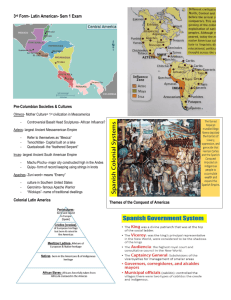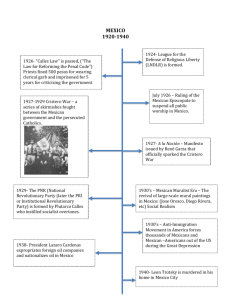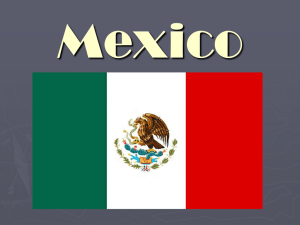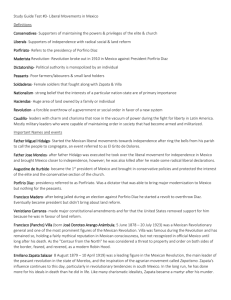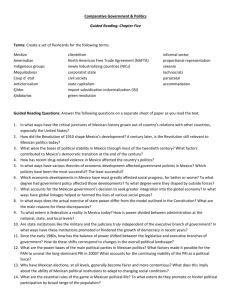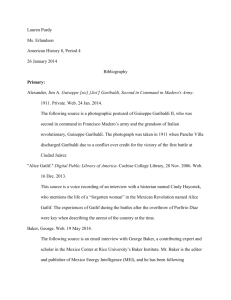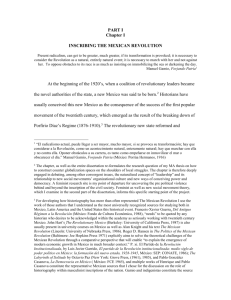HIST 233 - Winona State University
advertisement
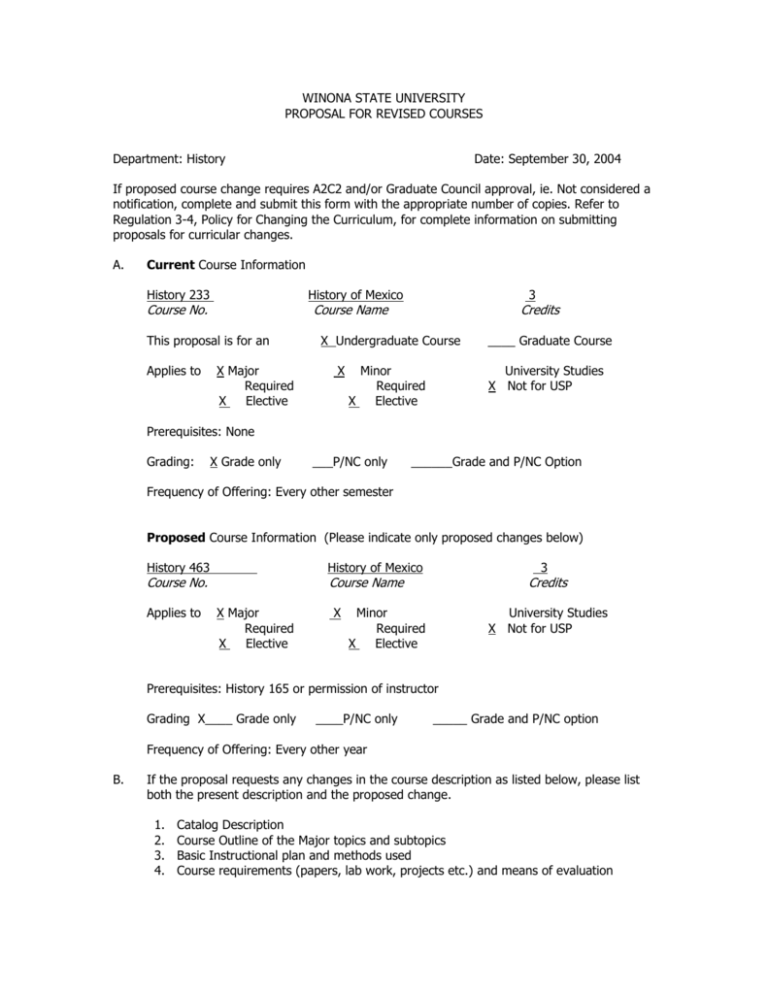
WINONA STATE UNIVERSITY PROPOSAL FOR REVISED COURSES Department: History Date: September 30, 2004 If proposed course change requires A2C2 and/or Graduate Council approval, ie. Not considered a notification, complete and submit this form with the appropriate number of copies. Refer to Regulation 3-4, Policy for Changing the Curriculum, for complete information on submitting proposals for curricular changes. A. Current Course Information History 233 History of Mexico Course No. This proposal is for an Applies to 3 Course Name X Major Required X Elective Credits X Undergraduate Course X Minor Required X Elective ____ Graduate Course University Studies X Not for USP Prerequisites: None Grading: X Grade only ___P/NC only ______Grade and P/NC Option Frequency of Offering: Every other semester Proposed Course Information (Please indicate only proposed changes below) History 463 History of Mexico Course No. Applies to 3 Course Name X Major Required X Elective X Credits Minor Required X Elective University Studies X Not for USP Prerequisites: History 165 or permission of instructor Grading X____ Grade only ____P/NC only _____ Grade and P/NC option Frequency of Offering: Every other year B. If the proposal requests any changes in the course description as listed below, please list both the present description and the proposed change. 1. 2. 3. 4. Catalog Description Course Outline of the Major topics and subtopics Basic Instructional plan and methods used Course requirements (papers, lab work, projects etc.) and means of evaluation 1. Catalog Description This course provides an in-depth examination of the history of the Mexican nation from pre-historic times to the present. Themes discussed include the Native American and Spanish roots of Mexican culture, the coming of independence and the construction of the nation state, the liberal-conservative conflict, the Mexican Revolution of 1910, the continuing Mexican Revolution, and the rise of the neo-Porfirian state in recent decades. 2. Course Outline of the Major Topics and Subtopics I. The Earliest Civilizations in Mexico A. The Olmecs of the eastern coast B. The Civilizations of Oaxaca (Zapotec and Mixtec) C. The Maya in the Yucatan II. The Central Mexican Indigenous Civilizations A. Great City of Teotihuacan B. The Aztecs, The Romans of the Americas C. The Aztecs and their Neighbors III. The Conquest A. The Earliest Explorations in Mexico B. Hernan Cortes and the Aztecs C. The Ambivalent Conquest of the Maya IV. The New Society in the Sixteenth Century A. The Church in Sixteenth Century Mexico B. Spanish-Indian Relations and the New Laws of 1542 C. The Administrative System: Mendoza brings Peace D. The Evolving Colonial Economy V. The Remainder of the Colonial Period A. Society and Culture in the 17th Century B. Economic and Political Change in the Colonial Siesta C. The Eighteenth Century: Reform or Repression VI. The Era of Independence A. Father Hidalgo and the Grito of Dolores B. Morelos continues the Struggle C. The Conservatives make independence happen VII. The Age of Caudillos A. The Early Nineteenth Century B. The Age of Santa Anna C. The War over Texas and the Mexican Cession VIII. Benito Juarez and the Rise of the Liberals A. The Liberal Revolution against Santa Anna B. The Constitutional Debate in 1857 C. The War of the Reform D. The French Intervention IX. The Beginnings of a True Nation State, 1876-1910 A. The Rise of Porfirio Diaz B. Differing Interpretations of Diaz C. Society in the Porfiriato X. The Mexican Revolution of 1910 A. The Outbreak of Violence and the failure of the Moderates B. Military Dictatorship C. The Constitution of 1917: Reform or Revolution XI. The Revolution Continues A. Alvaro Obregon initiates social change B. Calles and Growing Corruption C. The Apex of the Revolution under Lazaro Cardenas XII. The Death of the Mexican Revolution A. The Emergence of the Business Sector in the 1940’s B. Growing Disenchantment with the Regime C. The Crisis of 1968 D. The Economic Disaster of the 1980’s XIII. Contemporary Cultural Evolution A. The Comic Book as Cultural Icon B. Festivals and Public Celebrations C. Monuments as Symbols of Progress D. The Art of Diego Rivera and Frida Kahlo XIV. Contemporary Politics A. The Failure of Salinas B. The Landmark Election of 2000 C. President Fox and Reforms 3. Basic Instructional Plan and Methods Utilized The course will be conducted primarily through discussion with some occasional lectures. 4. Course requirements (Papers, lab work, projects Etc and Evaluation) Students will take regular quizzes on the readings to insure preparation and participation. Students will also take two essay examinations and a final exam, and will write a scholarly book review about one of the many new monographs in the field that have appeared recently. C. Rationale The department is proposing this course to broaden the upper-level electives for History and Social Science/History majors in the category “Histories of Developing Societies and Different Cultures.” As such, the course will substitute for History 233, which in the opinion of the department has been offered inappropriately as a survey course meeting “different culture” requirements under the old General Education program for the past 25 years. Further, the course requires work consistent with the expectations held for majors at the 400 level. Students read difficult works and analyze them, and will gain an understanding of the historiographical controversies that exist in the field. In addition, the study of this particular country is in much greater depth than offered in History 165, the Latin American history survey course. Further, making the class a 400 level course will be consistent with our other Latin American upper division offering focusing on a single nation. (History 469History of Brazil). D. Description of any impact of this proposal on other departments, programs, majors, or minors Approval of this course will not change the number of credits required by any program. It will offer an elective for History majors and minors. E. Description of any Impact that this proposal may have on the University Studies program The course will have no effect on the University Studies programs. Although a “Different Culture” course under the previous General Education system, the department never requested that the History of Mexico become part of the new University Studies curriculum for the reasons outlined above. Department contact person for this proposal: Peter Henderson 457-5414 phenderson@winona.edu
